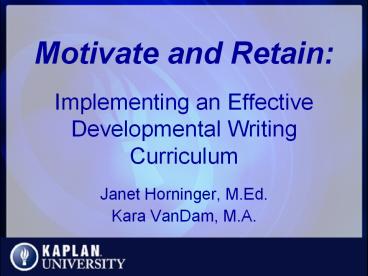Motivate and Retain: Implementing an Effective Developmental Writing Curriculum - PowerPoint PPT Presentation
1 / 17
Title:
Motivate and Retain: Implementing an Effective Developmental Writing Curriculum
Description:
Title: Motivate and Retain: Implementing an Effective Developmental Writing Curriculum Author: Kara VanDam Last modified by: Kara VanDam Created Date – PowerPoint PPT presentation
Number of Views:147
Avg rating:3.0/5.0
Title: Motivate and Retain: Implementing an Effective Developmental Writing Curriculum
1
Motivate and Retain Implementing an Effective
Developmental Writing Curriculum
- Janet Horninger, M.Ed.
- Kara VanDam, M.A.
2
A Need for Developmental Courses
- 75 of community college students never graduate1
- 53 of new college students lack basic reading,
writing, or math skills and require remediation2 - This is up from 29 of students just ten years
ago3
3
Traditional Developmental Courses
- Are often low-credit or no-credit courses
- Set students behind in their degree plan
- Isolate students by removing them from their
cohorts - Stigmatize students by placing them in a
special class - Label students as developmental or remedial
which to students dumb
4
An approach to solve these issues
- Our course is full-credit
- Our course meets same outcomes as traditional
Composition I course standards are not lowered - Students stay in degree sequence with their
cohorts - Our course and its students are not identified as
developmental, remedial or other
5
Best of all
- Students know they are in a real class!
- In the words of one student, Im just so excited
to be in a writing class that starts with a 100
6
How is all this accomplished?
- On the instructors side
- Instructors have strong experience in
developmental pedagogy - Instructors meet to share best practices
- Instructors perform a great deal of student
outreach - Instructors interact with students at a high
level - Instructors take the time to know their students
7
Why? Online Education Requires Different Teaching
Methods
- A higher level of interaction Students consider
maintaining a high-level of interaction to be the
most important role of the instructor in on-line
classes (Kearsley, 2000) - An understanding of the sacrifices our students
are making to attend college
8
How is all this accomplished?
- On the students side
- Sections are limited to 16 students
- Students are provided with a wide range of
supplemental services which includes tutoring and
reference material in our large Writing Center
9
How is all this accomplished?
- In the curriculum
- Sentence-level issues receive a great deal of
attention - Students work step-by-step through the entire
writing process with every assignment - Students see many sample assignments
10
Did it help? Yes! In first two terms
- Average failure rate decreased 20
- Failure rate in regular Composition I course
exceeded the failure rate in the developmental
course - The average grade point was .22 higher for these
developmental students than their regular
cohorts
11
Students liked the course and the instructors
better
- First two terms teaching and course measures
were significantly higher for the developmental
version
12
Did this Translate to Future Success?
- 74 of passing students continued to the next
term - The average next-term GPA of those students was a
2.7, a B- - 30 of students of these carried an A average in
the next term - Only 4 carried an F average the next term
- For those taking Comp II in the next term, the
average course grade was a B
13
Are We Helping All Who Need Help?
- Recall from the introduction that nationally 53
of students require some remediation - Yet, less than 10 of our students were placing
into this course - Option 1 Make cut-off on placement exam higher
so more students are placed in - Option 2 Understand that perhaps the norm
needs to change for whats regular
14
What Have We Done to Address This?
- While we are currently changing the placement
test, more significantly - We have incorporated much of what worked well in
the developmental into the regular curriculum - Students have to show more of their work during
the writing process - Students have more access to sample assignments
15
What Has Been the Impact?
- More data is needed, but signs are hopeful there
has been some improvement
16
What have we learned?
- Many students needing additional support can be
reached and retained. - Faculty can work closely with students and their
fellow instructors to build a strong, supportive
community in which all involved thrive.
17
References
- Boylan, H., Bonham, B., Bliss, L. (1992).
National study of developmental education
Students, programs and institutions of higher
education--Summary report. Boone, NC National
Center for Developmental Education. - Tritelli, D. (2003, Winter). From the editor.
Peer Review (Association of American Colleges and
Universities). Retrieved August 23, 2005 from
http//www.aacu-edu.org/peerreview/pr-wi03/pr-wi03
editor.pdf - Gose, B. (1997). Tutoring companies take over
remedial teaching at some colleges. The
Chronicle. Retrieved August 23, 2005 from
http//chronicle.com/colloquy/97/remedial/backgrou
nd.htm - Kearsley, G. (2000). Online education Learning
and teaching in cyberspace. Belmont, CA
Wadsworth/Thomson Learning.































